US may be forced to delay interest rate cuts, warns Powell
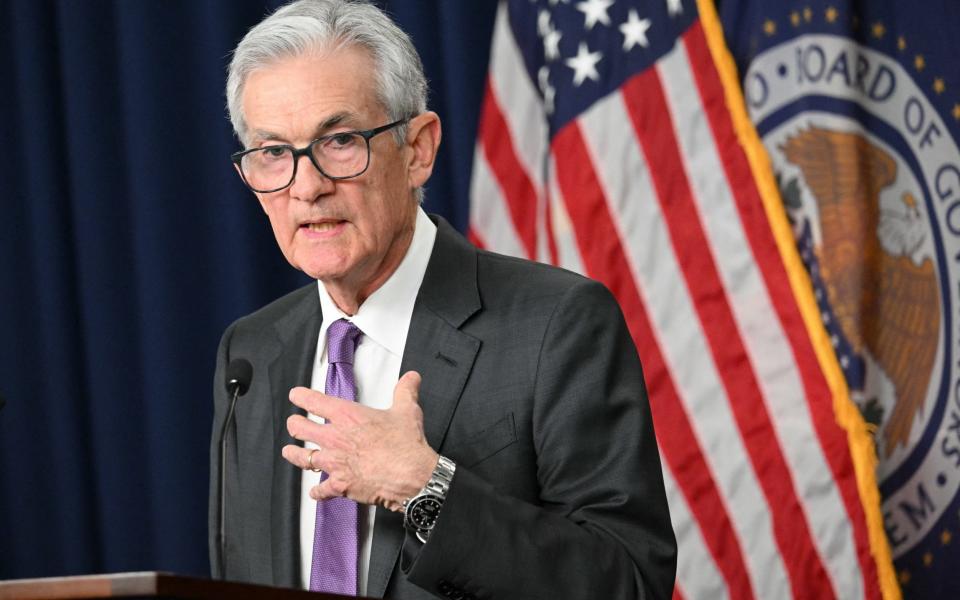
Jerome Powell has warned the Federal Reserve risks being forced to delay its first cut to interest rates because of stubborn inflation and strong economic growth, in a blow to mortgage borrowers around the world.
Strong jobs numbers and sustained price rises mean officials need to wait for more evidence before the world’s most powerful central bank can cut back borrowing costs, the Fed chairman said.
He added: “The job of sustainably restoring 2pc inflation is not yet done.
“We do not expect that it will be appropriate to lower our policy rate until we have greater confidence that inflation is moving sustainably down toward 2pc. Given the strength of the economy and progress on inflation so far, we have time to let the incoming data guide our decisions on policy.”
The Fed has held interest rates at 5.5pc since July of last year. Its influence is such that it affects borrowing costs around the globe, as well as helping to form other central banks’ decisions. It means that further sustained high rates in the US could impact mortgage borrowers and employers in the UK.
Mr Powell also rejected pressure on the Fed to take greater responsibility for tackling climate change.
“Fed policymakers are often pressed to take a position on issues that are arguably relevant to the economy but are not within our mandate, such as particular tax and spending policies, immigration policy, and trade policy,” he said.
“Climate change is another current example. Policies to address climate change are the business of elected officials and those agencies that they have charged with this responsibility. The Fed has received no such charge.”
The Bank of England, by contrast, has found itself in the midst of political arguments on climate change which have seen its mandate repeatedly changed with shifting emphasis placed on the environment.
Mr Powell’s warning on interest rates also threatens to derail the Bank of England’s plans to lower borrowing costs, as a significant break with Fed policy risks sending the pound falling against the dollar and pushing up the price of imported goods. The Bank of England’s base rate has stood at 5.25pc since August.
Traders in financial markets expect the Bank to cut to 5pc in June, with the Fed possibly waiting until a month later before it makes its first move downward.
America’s economy has proven remarkably resilient to higher borrowing costs.
Even as the UK fell into a brief recession at the end of last year and the eurozone economy ground to a halt, the world’s largest economy expanded by 0.8pc in the final quarter of 2023.
This growth has helped keep inflation above the Fed’s target and so leaves policymakers cautious when it comes to cutting rates.
“Recent readings on both job gains and inflation have come in higher than expected,” said Mr Powell.
“The economy added an average of 265,000 jobs per month in the three months through February, a faster pace than we have seen since last June. And the higher inflation data over January and February were above the low readings in the second half of last year.”
Nancy Vanden Houten at Oxford Economics said this economic strength “comes down to the US consumer.”
“When mortgage rates started to climb we saw a toll taken on housing activity, but all in all, given the magnitude of higher rates, the housing sector has been pretty resilient,” she said.
“By and large the consumer in the US has continued to chug along and spend at a healthy pace, and that has been the main reason for growth staying so strong.”
Inflation in the eurozone fell more sharply than expected in March, with prices up 2.4pc on the year. Inflation has not been lower since mid-2021.
Meanwhile gold prices hit a fresh record high of just over $2295 per ounce, up from $2066 at the start of the year as investors pile into safe-haven assets.
Read the latest updates below.
06:22 PM BST
Signing off…
Thanks for joining us. Chris Price will be back in the morning, but in the meantime here are a few of our latest stories:
05:34 PM BST
‘Sticky inflation’ could delay rate cuts, warns Fed chairman
Jerome Powell has warned the Federal Reserve risks being forced to delay its first cut to interest rates because of sticky inflation and strong economic growth, in a blow to mortgage borrowers around the world. Tim Wallace reports:
Strong jobs numbers and sustained price rises mean officials need to wait for more evidence before the world’s most powerful central bank can cut back borrowing costs, the Fed chairman said.
“We do not expect that it will be appropriate to lower our policy rate until we have greater confidence that inflation is moving sustainably down toward 2pc. Given the strength of the economy and progress on inflation so far, we have time to let the incoming data guide our decisions on policy,” he said.
The Fed has held interest rates at 5.5pc since July of last year.
The warning also threatens to derail the Bank of England’s plans to lower borrowing costs, as a significant break with Fed policy risks sending the pound falling against the dollar, pushing up the price of imported goods and so reviving inflation in Britain.
The Bank of England’s base rate has stood at 5.25pc since August.
Traders in financial markets expect the Bank to cut to 5pc in June, with the Fed possibly waiting until a month later before it makes its first move downward.
04:56 PM BST
Footsie closes in the green
The FTSE 100 ended the day much as it started, despite a fall earlier. It closed up just 0.03pc. The biggest riser was mining company Fresnillo, up 3.7pc, followed by Barclays, up 2.4pc. The biggest fallers were BT, down 4.6pc, followed by industrial supplier RS Group, down 3.17pc.
Meanwhile, the FTSE 250 closed up 0.2pc. City firm Close Brothers closed up 6.4pc, while Royal Mail owner International Distributions Services closed up 4.32pc. The biggest fallers were Moonpig, down 4.6pc, followed by investment company Bridgepoint, down 3.6pc.
04:49 PM BST
Private hospital giant sells hospital amid NHS crisis
The private hospital giant which started life as Bupa Hospitals has sold its Tunbridge Wells hospital to the NHS in a move it said was part of its “continued focus on disciplined capital allocation”.
Spire Healthcare has received £10m from the Maidstone and Tunbridge Wells NHS Trust for the hospital, which has just two operating theatres, 10 consulting rooms and 28 beds.
The sale will help the NHS cut waiting lists but be less appreciated by surgeons with private practices. Trust chief Miles Scott said the purchase would “provide additional NHS capacity” locally.
Spire shares are down 0.9pc today.
04:24 PM BST
Deutsche Bank to roll out ‘reset and recovery pods’ for menopausal women
Deutsche Bank is preparing to roll out “reset and recovery pods” for menopausal women at its new London office. Adam Mawardi reports:
The German investment bank is building private booths specifically designed to support employees going through menopause.
Each pod features reclinable chairs, plus cooling and lighting controls designed to support individuals struggling with menopause or perimenopause symptoms, such as hot flushes and migraines.
The pods are part of Deutsche Bank’s new wellness suite, which once finished in July this year will include physiotherapy facilities, GP clinics, a mindfulness space and a multifaith prayer room.
The facilities were also designed to support workers with neurological conditions, such as ADHD and autism.
04:15 PM BST
Norway could drop Rio Tinto stake in ethical investment drive
The ethics adviser to Norway’s giant sovereign wealth fund is mulling whether to recommend selling the fund’s stake in Rio Tinto because of environmental concerns, according to a report.
The Wall Street Journal said that the influential adviser, known as the Council on Ethics, has told Rio Tinto that it is assessing whether Norway should retain its stake in the mining company as a result of the environmental damage from operating in the Brazilian Amazon.
Rio Tinto said that the Mineração Rio do Norte (MRN) mine in Brazil is only 22pc owned by the group. A spokesperson said:
While the MRN operation is not managed by Rio Tinto, it has been working to progressively improve its environmental and social performance to meet industry best practice and our expectations as a shareholder. We will continue to support and drive this improvement through our Board and committee roles, and by providing technical assistance.
The Council on Ethics have been approached for comment.
The sovereign wealth fund reportedly had a 2.24pc stake worth $2.7bn (£2.1bn) at the end of last year.
03:41 PM BST
What went wrong with Scottish ferries
Thhe problems with the company that runs ferries to the Western Isles come down to its ownership by the Scottish government, Eamonn Butler, director of the Adam Smith Institute, says:
Like most government-run businesses, the focus is on current spending, not on long-term capital replacement. The design life of a Scottish ferry is 25 years. The average age of the fleet is very nearly that. Some vessels are much older.
The Caledonian Isles, serving the busiest route (Ardrossan to Arran), is 30 years old. Its systems have been replaced bit by bit and sometimes they don’t talk to each other. It’s currently in dock for steelwork to keep it seaworthy. So Arran is now being saved by a 40-year-old boat with a fraction of the capacity.
Faced with mounting complaints, the Scottish government finally gave in and pledged £1bn for new vessels.
But it had to keep the Greens sweet, and the Greens insisted the new vessels be “dual fuel”, running on liquid natural gas (LNG) as well as diesel.
Nobody had ever operated vessels like this, nor was there anywhere to store LNG in Scotland (it is trucked up from the Thames), and it’s not safe to be used near ports, but the ships were duly ordered.
The RMT union, which of course calls he shots in any government transport monopoly – and this is the most overstaffed ferry system in Europe – insisted on onboard staff accommodation, fitness suites and the rest, making the ships larger and passenger capacity smaller.
The unique specifications added to costs.
Oh, and the SNP insisted that they had to be built in a Scottish shipyard, even though foreign yards have much greater capacity.
Unsurprisingly, they proved too big and too complicated, and the government agencies kept changing the specification.
Eventually the shipyard gave up so that was nationalised too.
The two new-technology ships were budgeted at just under £100m (for comparison, you can buy a regular ferry from several countries for £20m or less.
Now the estimate is over £300m. And they’re five years late.
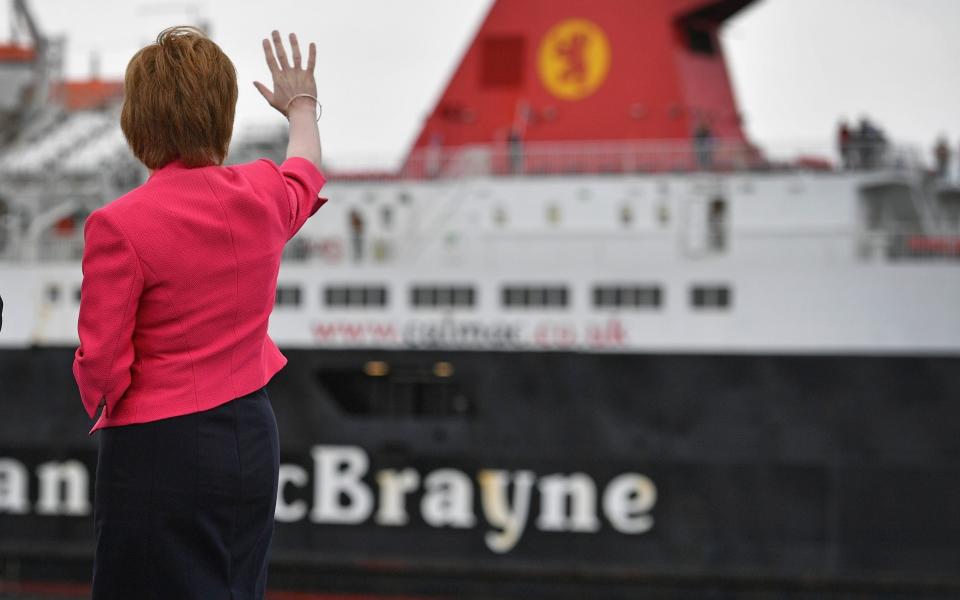

03:33 PM BST
Elon Musk would ‘definitely buy’ Disney shares if billionaire activist wins board seats
Elon Musk has vowed to take a stake in Disney if billionaire activist investor Nelson Peltz wins his battle to secure a seat on the US entertainment giant’s board. Matthew Field has the details:
Mr Musk, writing on the social media site X, said the hedge fund manager “should definitely be on the Disney board”.
He added: “While I don’t own any Disney shares today, I would definitely buy their shares if Nelson were elected to the board.”
The intervention comes as Disney faces down an investor rebellion led by Mr Peltz, who is seeking two board seats and an overhaul of the company’s strategy as it navigates the shift to digital streaming. A crunch vote over the makeup of Disney’s board closes on Wednesday evening.
Mr Musk has been a vocal critic of Disney and the leadership of chief executive Bob Iger over its decision to halt advertising on Twitter, now rebranded as X.


03:31 PM BST
Handing over
I’m heading off now for a brew and Alex Singleton, with his cup of tea by his side, will deliver you the latest updates from this point.
Tea making is a big deal on the business desk at The Telegraph and in honour of those serving up our hard-earned cuppas, here is a picture taken today of workers picking tea leaves at a field in Ruichang, in central China’s Jiangxi province:


03:27 PM BST
Spotify to raise prices for audiobook listeners
Spotify plans to raise its prices for customers who listen to its audiobooks as it tries to push towards profitability.
The Swedish streaming giant will increase prices by between $1 and $2 a month in five markets around the world, including the UK, according to Bloomberg News.
Shares jumped by 4.6pc in early trading.
The price increases are expected to cover the cost of audiobooks, which customers using its paid plan can currently enjoy for 15 hours a month.
However, audiobooks will reportedly no longer be covered under its premium plan, with customers wanting to listen asked to pay an extra fee.
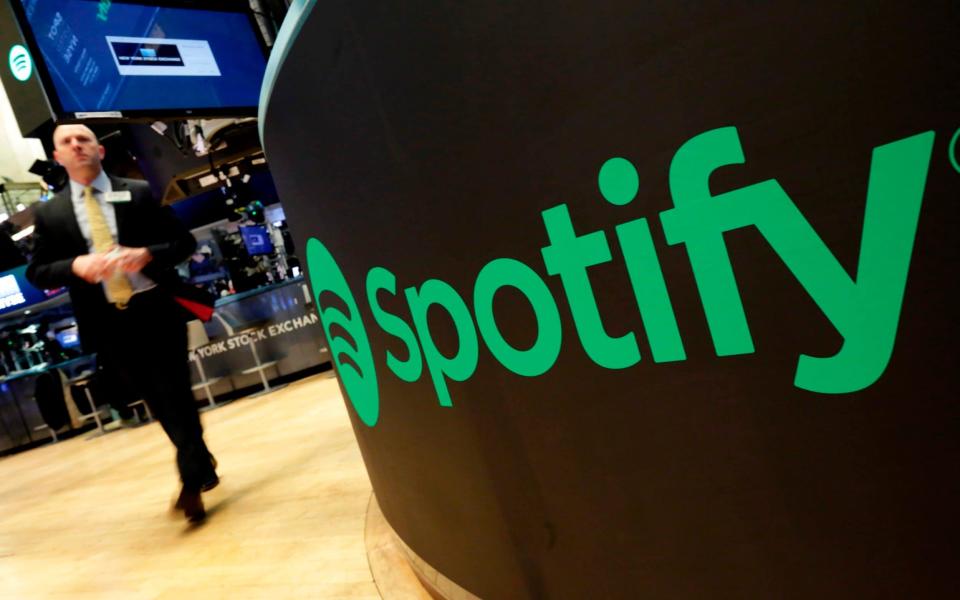

03:10 PM BST
Wall Street rebounds as services sector slows
US stock indexes reversed losses after softer-than-expected services sector data offered relief to investors worried about fewer-than-expected interest rate cuts from the Federal Reserve this year.
The Institute for Supply Management’s non-manufacturing PMI came in 51.4 against expectations of 52.7 forecast by economists.
The Dow Jones Industrial Average was up 110.70 points, or 0.3pc, at 39,280.94, the S&P 500 was up 12.22 points, or 0.2pc, at 5,218.03, and the Nasdaq Composite was up 14.53 points, or 0.1pc, at 16,254.98.
02:57 PM BST
British Steel electric arc furnace given go-ahead
British Steel has been granted planning permission to build an electric arc furnace at its Teesside plant.
The company said the development is a key milestone in its £1.25bn decarbonisation plan.
The application was approved by Redcar and Cleveland Borough Council following a detailed consultation period.
Its application to build another of the furnaces at its Scunthorpe site will be decided imminently by North Lincolnshire Council.
British Steel said its proposed transformation is the biggest in more than a century of steelmaking and is subject to “appropriate support” from the Government.
British Steel president and chief executive Xijun Cao said: “The proposed installation of EAFs in Scunthorpe and Teesside is central to our journey to a green future.
“Our owner, Jingye, is committed to the unprecedented investment decarbonisation requires.”
Both proposed furnaces would replace the ageing iron and steelmaking operations at British Steel’s Scunthorpe site which are responsible for the vast majority of its CO2 emissions.
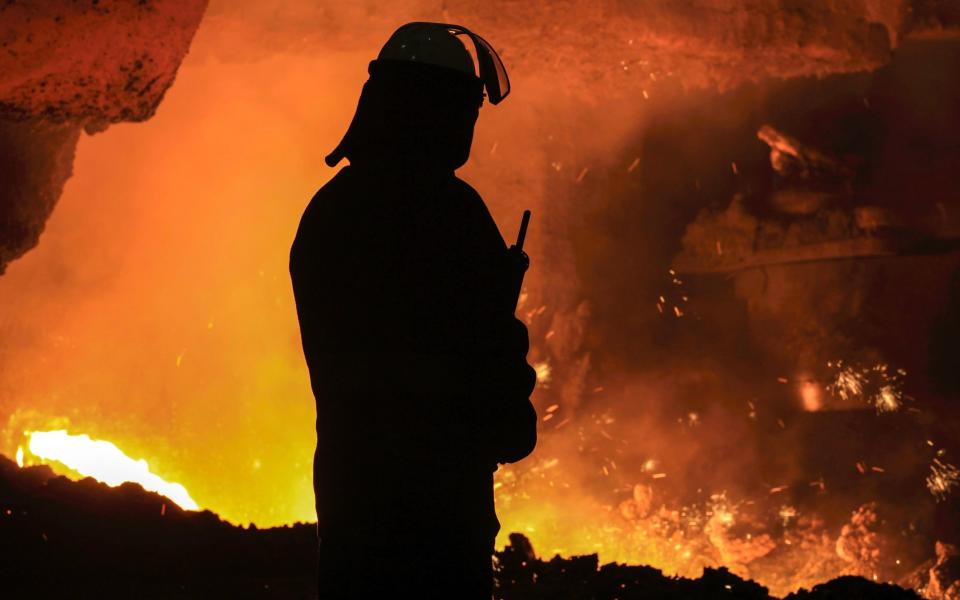

02:34 PM BST
Wall Street slips at the open
The main US indexes opened lower as strong private payrolls data fanned fears of fewer-than-expected interest rate cuts by the Federal Reserve this year.
The Dow Jones Industrial Average fell 30.65 points, or 0.1pc, at the open to 39,139.59.
The S&P 500 opened lower by 11.44 points, or 0.2pc, at 5,194.37, while the Nasdaq Composite dropped 61.65 points, or 0.4pc, to 16,178.80 at the opening bell.
02:20 PM BST
US bond yields hit highest point this year after jobs growth
The US debt market slumped after figures showed private sector hiring remained strong last month – dampening hopes for swift interest rate cuts.
The yield on five-year and 30-year US Treasuries rose to their highest level so far this year to 4.39pc and 4.55pc respectively.
Kathleen Brooks, research director at XTB, said:
The market is increasingly assuming that a US rate cut is some months away.
After another strong data report, this time the March ADP private sector payrolls report, the market is increasingly expecting fewer rate cuts from the Fed this year, with the first rate cut currently on a knife edge between July and September.
The market is currently pricing in a 36pc probability that the first-rate cut will be in September, this is up from 14pc a month ago. The market is becoming increasingly less optimistic about the prospect of near-term rate cuts, and this is having an impact across financial markets.
02:15 PM BST
Daniel Levy ‘in discussions’ over Tottenham investment
Tottenham are “in discussions with prospective investors” in a bid to “capitalise on our long-term potential”, chairman Daniel Levy has revealed.
The Premier League club’s total revenue for the financial year to June 30, 2023 exceeded half a billion pounds for the first time, with the figure of £549.6m a significant increase on £444m for the previous year.
However, operating expenses including first-team costs have risen by 21pc to £487.9m, with a loss of £86.8m put down to “significant and continued investment in the playing squad” in the financial results published by the club today.
Levy announced in his statement accompanying the results that Spurs were looking for an injection of equity.
He wrote: “To capitalise on our long-term potential, to continue to invest in the teams and undertake future capital projects, the club requires a significant increase in its equity base.”
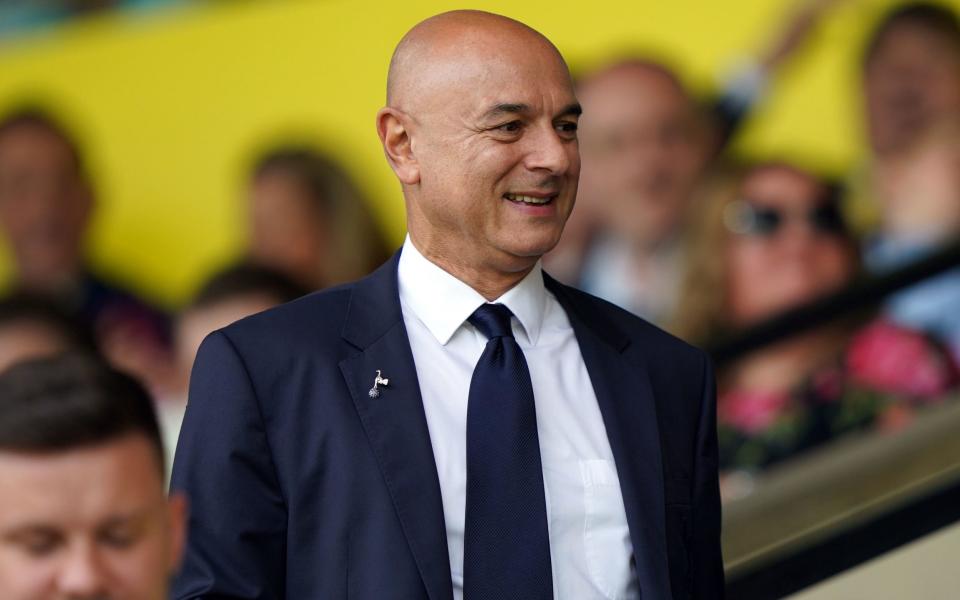

01:54 PM BST
US pay rises faster than inflation
Pay was up 5.1pc over the last year in the US economy for those who remained in their jobs, and by 10pc percent for those who switched, according to the latest figures from ADP.
It indicates pay is outstripping the US inflation rate, which stood at 3.2pc in February.
Chief economist Nela Richardson said: “Inflation has been cooling, but our data shows pay is heating up in both goods and services.”
ADP’s figures come two days ahead of US government data on US hiring, which will help to paint a clearer picture of the health of the overall labor market.
ADP said US private sector hiring came in well above expectations last month, adding 184,000 jobs in March and revising up the February jobs data, from 140,000 to 155,000.
01:43 PM BST
Pound close to six-week low amid strong US economy
The pound was near its six-week low amid speculation that the Bank of England may yet cut interest rates more this year than the US Federal Reserve.
Sterling was flat against the dollar at $1.257, having traded close to $1.29 at the start of the month. The pound was 0.1pc lower versus the euro, which is worth close to 86p.
The UK currency has dropped after several sets of strong economic data in the US raised doubts about the pace of interest rate cuts by the Fed.
01:24 PM BST
US private sector adds most jobs in nine months
Private companies hired new staff at the fastest pace in nine months in a further sign of strength in the US economy.
Private employers in the US added 184,000 jobs in March, which was the biggest jump in hiring since July, led by leisure and hospitality.
It was higher than the 150,000 estimated by analysts and will likely dampen hopes of interest rate cuts by the US Federal Reserve as a resilient economy risks stoking inflation.
ADP chief economist Nela Richardson said:
March was surprising not just for the pay gains, but the sectors that recorded them.
The three biggest increases for job-changers were in construction, financial services, and manufacturing.
Inflation has been cooling, but our data shows pay is heating up in both goods and services.
12:58 PM BST
Drummond is scapegoat for SNP ferry fiasco, says senior Tory MSP
Scottish Conservative transport spokesman Graham Simpson said:
Robbie Drummond is now the latest scapegoat for the SNP’s ferries fiasco.
Mairi McAllan – as the SNP minister responsible – is presiding over utter chaos in Scotland’s ferry network.
Not a single ministerial resignation has been offered over this scandal yet now the head of both CalMac and Ferguson Marine have been fired in the space of two weeks.
The minister needs to urgently explain – not least to betrayed islanders – what is going on here and why she believes sacking CalMac’s top boss is a good idea.
The buck ultimately stops with them over the failure to deliver lifeline vessels to our islanders.
12:49 PM BST
CalMac statement on boss’s sudden departure
Mr Drummond’s departure was announced in a statement from the company. It said:
The Caledonian MacBrayne Ltd board takes the responsibility of delivering the Clyde and Hebrides Ferry Service (CHFS) contract extremely seriously.
It recognises that the island communities served by CalMac have faced real challenges over this past year. These challenges are likely set to continue until new vessels are introduced to the fleet over the coming years.
In this context, the board wants to strengthen the focus further on operational performance of an ageing fleet, resilience and enhanced dialogue and responsiveness with the customers and the communities CalMac serves.
As a consequence, the board has reviewed the executive leadership of the organisation to ensure that it is best placed to achieve that during some challenging years ahead.
As part of that review, current CEO Robbie Drummond is stepping down with immediate effect.
12:23 PM BST
Ferry boss steps down amid delays and disruption
The chief executive of Caledonian MacBrayne (CalMac), the UK’s largest ferry operator, is stepping down as it faces ongoing challenges with its fleet.
The company announced that Robbie Drummond is stepping down with immediate effect.
It comes just over a week after the chief executive of the state-owned shipyard Ferguson Marine, David Tydeman, was sacked by its board.
Mr Drummond’s departure comes after a review by the board of CalMac, which is also wholly owned by the Scottish Government.
In recent years the ageing nature of CalMac’s ferry fleet has led to delays and disruption on its routes around the west coast of Scotland.
These problems have been compounded by ongoing delays to two ferries being built at Ferguson Marine in Port Glasgow.
The two ferries, which will ultimately serve routes in the west of Scotland with CalMac, are some six years late and will cost around three times the original price of £97m.
Ministers are also due to make a decision this summer on the awarding of the ferry services contract for the west coast, something which would have a material impact on CalMac as a going concern.
Mr Drummond was previously managing director of CalMac before becoming its chief executive in October 2022.


12:11 PM BST
Apple and Nvidia chip supplier forced to close factory after earthquake
The main contract chipmaker for Apple and Nvidia has been forced to evacuate factories and halt some manufacturing after Taiwan was hit with the biggest earthquake in 25 years.
Taiwan Semiconductor Manufacturing Co, known as TSMC, said it is assessing the impact of the earthquake, which measured 7.7 on the Richter scale.
Taiwanese companies like TSMC make and assemble the vast majority of the semiconductors that go into devices from iPhones to cars.
TSMC shares slid 1.3pc, while smaller local rival UMC was down nearly 1pc after it also shut down machinery at some plants.
The earthquake struck Taiwan early this morning, killing at least nine people and injuring hundreds in the strongest tremor to hit the island in at least a quarter of a century.
[embedded content]
11:47 AM BST
US markets on track to fall at the open
Wall Street is poised for more gloom when trading begins later as jittery investors await a speech by Federal Reserve chairman Jerome Powell, which could indicate the next steps for interest rates.
The tech-heavy Nasdaq and the blue-chip Dow closed at two-week lows on Tuesday as Treasury yields rose in the wake of stronger-than-expected manufacturing activity and factory orders.
The figures raised doubts whether the Fed will cut interest rates three times in 2024 as widely expected.
The benchmark 10-year US Treasury yield edged up to 4.38pc, having touched a 2024 peak of 4.05pc on Tuesday.
Mr Powell will speak shortly after 5pm today and private payrolls and services sector data could offer fresh insights on the US economy.
Traders are pricing in a 62pc chance that the Fed will cut interest rates by 25 basis points in June, according to CMEGroup’s FedWatch tool, slightly down from about 64pc a week ago.
In premarket trading, the Dow Jones Industrial Average was down 0.1pc, the S&P 500 had fallen 0.2pc and the Nasdaq 100 was down 0.4pc.
11:29 AM BST
Royal Mail to cull letter deliveries in second class post shake-up
Second class letters will be delivered just three times a week under new proposals submitted by Royal Mail.
Our reporter James Warrington has the details:
The postal service has outlined plans to deliver second class post on every other weekday as it looks to shore up its finances amid a slump in letter sending.
Bulk business mail would also fall under second class, meaning bank statements, bills and tax returns will arrive within three working days rather than two.
However, Royal Mail said it would continue to deliver first class post six days a week as it acknowledged the importance of next-day and Saturday deliveries for industries such as magazine publishers and greeting card makers.
The company is also in talks with the NHS over ways to ensure greater reliability for time-sensitive medical letters.
Read how it could mirror the hybrid system currently used by many GP practices.
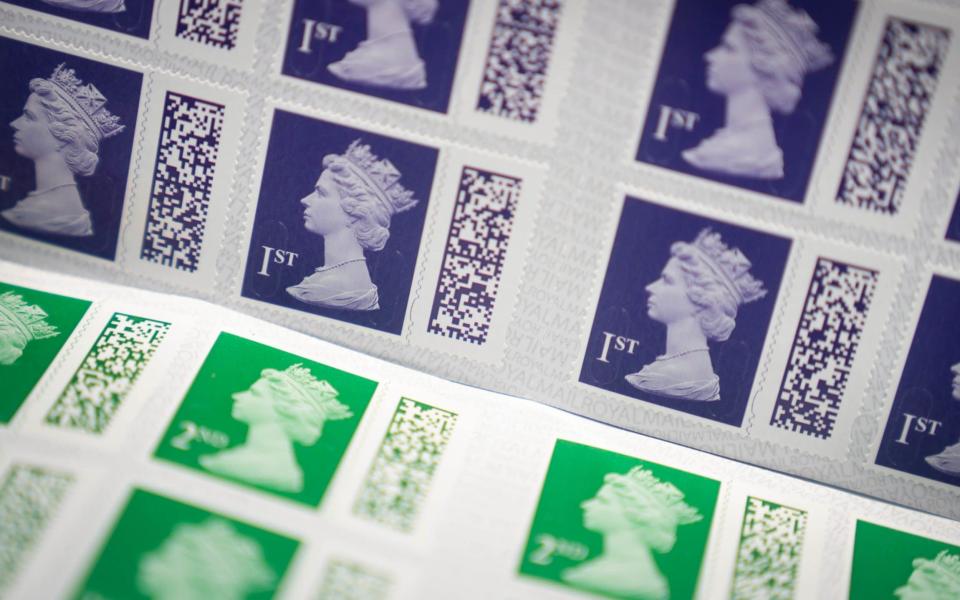

11:14 AM BST
Oil prices rise as cartel’s supply cuts expected to be upheld
Oil prices have held near five-month high ahead of a review which is likely to confirm supply cuts by the Opec cartel and its allies.
Brent crude was last up 0.3pc to more than $89 a barrel after rallying on Tuesday. US-produced West Texas Intermediate was up 0.3pc to more than $85.
Opec and its allies are due to review crude markets and supply policy at an online gathering today, which officials from member nations predict will leave the group’s overall strategy unchanged.
Meanwhile, the American Petroleum Institute is expected to report that US stockpiles fell by more than 2m barrels last week.
10:57 AM BST
Asda slips further behind rivals as sales growth slumps
Asda has fallen further behind supermarket rivals after its sales growth effectively ground to a halt, new figures reveal.
Our retail editor Hannah Boland has the latest:
Sales at Asda, which is owned by the billionaire Issa brothers and private equity firm TDR Capital, were up just 0.8pc in the last 12 weeks compared to last year, according to analysis firm NIQ.
The supermarket’s growth was much slower than rivals Sainsbury’s and Tesco, which recorded rates of 7.9pc and 6.3pc respectively over the period. Marks & Spencer also posted growth of 11.2pc.
The figures show Asda lagging behind all major rivals over the period, with its market share slipping to 11.7pc compared to 12.3pc a year earlier.
This chart shows how Asda sales have stalled.


10:28 AM BST
Eurozone expected to cut interest rates before UK and US as inflation falls
The eurozone is expected to begin cutting interest rates before the US and Britain after inflation fell more than expected last month.
Money markets think the European Central Bank will begin lowering its key deposit rate from its record high of 4pc in June after prices increased at a slower than expected 2.4pc in the year to March.
The inflation reading was lower than the 2.5pc predicted by analysts and down from 2.6pc in February.
Andrew Kenningham, chief Europe economist at Capital Economics, said it is “very likely” the ECB will begin cutting rates in June.
By contrast, the Bank of England is not priced in to make its first cut until August, while traders think the US Federal Reserve could leave its first cut as late as September.
Derivatives trades indicate that both have a roughly 50pc chance of announcing cuts in June.
Mr Kenningham added:
Overall, today’s data are consistent with the ECB’s and our own forecast that headline inflation will be very close to the 2pc target in the second half of this year and that core inflation will fall steadily.
We expect policymakers to leave rates unchanged next week but begin cutting them in June.
10:15 AM BST
Eurozone inflation falls as traders price in June rate cut
Inflation fell more than expected in the eurozone in March, official figures show, as price rises eased in Germany and France.
Prices rose by 2.4pc in the 20 countries that use the euro, which was below the 2.5pc predicted by financial markets.
It brings the European Central Bank ever closer to its inflation goal of 2pc, with traders pricing in an interest rate cut by June.
Inflation has fallen from 2.6pc in February, but the bank is still expected to hold rates steady at its next meeting on April 11.
Food inflation fell to 2.7pc from 3.9pc, and energy prices dropped by 1.8pc according to Eurostat, the European Union’s statistics agency. Meanwhile, core inflation, which excludes volatile food and energy costs, eased to 2.9% from 3.1% in February.
Inflation fell to 2.3pc in Germany from 2.7pc the month before and to 2.4pc in France from 3.2pc.
Carsten Brzeski, global head of macro at ING, said the data from Germany — the eurozone’s largest economy — “brings some relief for the ECB”.
Eurozone inflation comes in much softer than expected. My own seasonal adjustment suggests that monthly price growth was down for the major core categories. Really encouraging for rate cuts, but the ECB will want to wait until June to act. pic.twitter.com/5ncYbm8FVb
— Bert Colijn (@BertColijn) April 3, 2024
10:05 AM BST
Eurozone inflation falls to 2.4pc
Inflation in the eurozone dropped to 2.4pc last month, according to preliminary official estimates.
Prices rose at a slower pace than the 2.6pc recorded in February by Eurostat.
09:43 AM BST
Gas prices fall amid high stockpiles
The price of wholesale gas has dropped to its lowest level in nearly three weeks as high storage levels weakened demand for fuel.
Europe’s benchmark contract dropped for a third day in a row, declining as much as 3pc towards €25 per megawatt hour.
Analysts Patricio Alvarez and Joao Martins said: “Record storage fill at the end of Europe’s winter potentially cuts its liquefied natural gas needs over the summer and impedes increased price competition with Asian buyers.”
They said industrial demand remains as much as 20pc below levels seen prior to Europe’s energy crisis, amid a slow recovery in its manufacturing sector.
The UK gas contract fallen as much as 3pc to less than 64p per therm.
09:20 AM BST
Turkey’s inflation hits 68.5pc
Inflation gathered pace in Turkey, rising to 68.5pc in March, official figures show.
The increased price rises comes after President Recep Tayyip Erdogan’s party was given a drubbing in local elections that many blamed on the out-of-control cost of living.
Last month the cost of education, health, transport and food showed the biggest increases, after inflation reached 67.07pc in February, the country’s statistics agency TUIK said.
But ENAG, a group of independent economists, said their own calculations put the year-on-year figure at almost 125pc.
Finance Minister Mehmet Simsek wrote that “monthly inflation decreased in line with our forecast” as he pointed to slowing month-on-month inflation – at 3.16pc rather than February’s 4.53pc.
It comes after Turkey returned to orthodox central bank policy last year, raising the headline interest rate to 50pc as the government also vowed to control spending.
09:05 AM BST
Virgin Atlantic on course to return to profit after Covid pain
Virgin Atlantic has revealed record revenues and said it is on course to return to profitability this year after the struggles of the Covid years.
The airline reported record total revenue of £3.1bn, up £265m on 2022, while underlying profits hit a record £352m as it reached the midpoint of a four-year turnaround plan.
Losses before tax and exceptional items narrowed to £139m from £206m in the previous year as it carried 5.3m passengers.
Chief executive Shai Weiss said:
In 2023, we capitalised on continued strong demand for leisure air travel and holidays, which shows that desire for experiences and travel remains, resulting in record revenues.
A loss is never satisfactory; however, our performance and results illustrate that we have made really good progress in 2023, the plan is working, and Virgin Atlantic is on course to return to profitability in 2024.
My gratitude goes to our teams, who go above and beyond to deliver an amazing experience, making our customers smile every day.
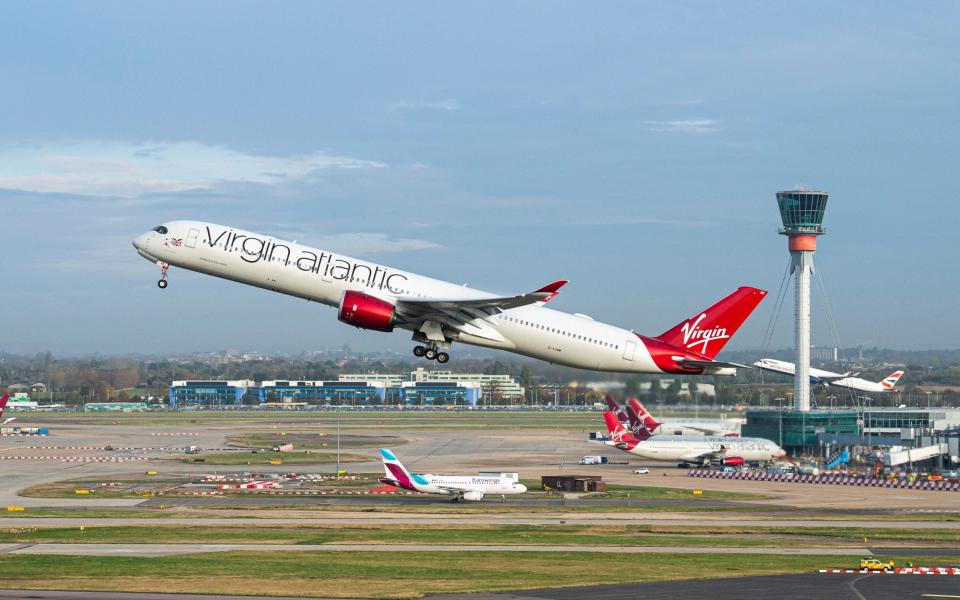

08:46 AM BST
UK markets fall amid fading hopes for interest rate cuts
UK stocks opened lower in a mirror of a global market retreat as investors grow increasingly sceptical that the Federal Reserve will cut interest rates as much as hoped this year.
The internationally-exposed FTSE 100 was down 0.5pc while the more UK-centric FTSE 250 had dropped 0.4pc, following a weaker close on Wall Street on Tuesday.
Shares in Topps Tiles fell as much as 6.6pc after the retailer warned that subdued demand for home improvements in 2024 would impact its half-year profit.
Meanwhile, Dr Martens climbed as much as 5.3pc following a Reuters report that investment firm Marathon Partners Equity Management had called on the boot maker to initiate a strategic review that could lead to a sale.
Later today, Federal Reserve chairman Jerome Powell will give a speech, which could offer fresh clues into the timeline for interest rate cuts.
08:32 AM BST
London struggles to attract new companies
Peel Hunt’s concerns about stock markets comes amid a broader slowdown in activity among investors in recent years, reflecting market volatility, economic uncertainties and political tensions.
London has struggled to attract new companies, and several businesses that are listed in the capital have abandoned or downgraded their listing.
These include travel giant Tui, which is ditching its London listing in favour of Frankfurt, building company CRH, which opted to move its primary listing from the FTSE 100 index to New York, and drug maker Indivior, which is considering moving its primary listing to the US this year.
Furthermore, We Soda said last June that it had been forced to cancel its initial public offering (IPO) on the London Stock Exchange due to “extreme investor caution” among UK investors.
It was set to be the UK’s first major IPO of the year.
Peel Hunt said in its latest trading update to shareholders that market trading volumes remain low and it expects that to continue until there are meaningful signs of recovery in the UK economy, and investors stop taking money out of funds.


08:14 AM BST
Network Rail to spend £2.8bn on extreme weather improvements
Network Rail has announced it is ramping up spending on protecting the railway from climate change and extreme weather.
The Government-owned company, responsible for Britain’s railway infrastructure, said it will invest around £2.8bn over the next five years in relation to these issues.
This will fund measures such as making embarkments more resilient, recruiting nearly 400 additional drainage engineers, training hundreds of operational staff to better interpret weather forecasts, and installing CCTV at sites with a high risk of flooding.
Network Rail chief executive Andrew Haines said:
Climate change is the biggest challenge our railway faces. The extreme weather of the past year, that has seen an unprecedented 14 named storms, has taken its toll on our railway – with experts predicting more of the same to come.
We are responding to that challenge with a huge investment in making our railway more resilient and better-performing for rail users during such events.
We can never completely weatherproof our railway, but we can be better prepared and mitigate the worst that Mother Nature throws at us – now and into the future – to keep passengers and services safe and moving.
This spending is part of Network Rail’s £45.4bn investment plan for the five years from April 1.


08:05 AM BST
UK markets open lower
After briefly rising above 8,000 on Tuesday, the FTSE 100 continued its subsequent downward slide as trading began in London.
The UK’s blue chip index has dropped 0.2pc to 7,917.86 while the midcap FTSE 250 has fallen 0.1pc to 19,695.35.
07:59 AM BST
Topps Tiles issues profit warning as home owners put off DIY projects
Retailer Topps Tiles has warned over a hit to profits as under-pressure homeowners continue to put major home improvement projects on the back burner.
The group reported an 11.3pc tumble in like-for-like sales in its second quarter to March 30.
It marks a worsening sales decline on the 7.1pc drop seen in the previous quarter, although Topps said this was partly due to the timing of Easter this year.
The group said: “Subdued demand in the domestic repair, maintenance and improvement sector, especially for bigger ticket projects, has persisted into 2024, resulting in lower footfall into Topps Tiles stores.”
Topps cautioned that first-half profits would be impacted by a number of factors, including the weaker market.
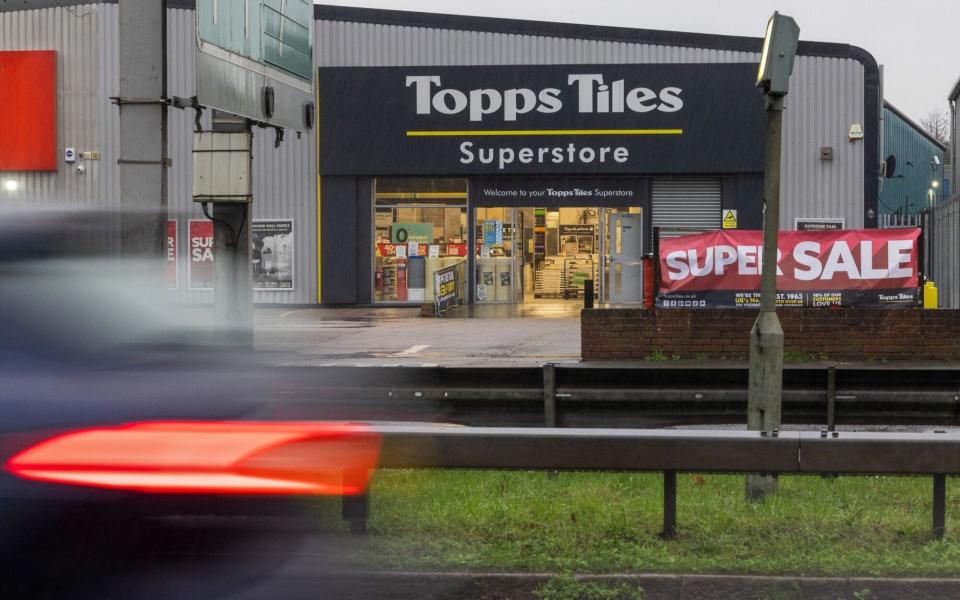

07:57 AM BST
Peel Hunt expects loss as fewer companies float on stock markets
The warning about the decline in London listings comes as City broker Peel Hunt told shareholders that it expects to report a loss for the year amid weak activity in the IPO market.
The investment bank said it expects revenues for the full year to rise by 4pc to £85.5m – in line with expectations – despite fewer companies deciding to list in London, known as an IPO.
The increase in revenues was “driven largely by investment banking, with M&A revenues in particular accounting for a large proportion of investment banking deal fees”.
It told shareholders it had won 18 new clients, including five FTSE 350 companies. It said:
Market trading volumes remain low and equity capital market issuance continues to be subdued.
We expect these trends to continue until there are meaningful signs of recovery in the UK economy and fund outflows reverse.
Whilst IPO activity in the UK remains muted, there has been more activity in Europe and sentiment towards IPOs is improving in the UK, with investors increasingly willing to engage in relation to high quality companies.
07:45 AM BST
London Stock Exchange to lose hundreds of companies by 2028, warns City broker
Hundreds of companies could leave the London Stock Exchange over the next four years as large buyers take advantage of low business valuations, a City broker has warned.
Peel Hunt raised concerns about the “relentless” pace of companies leaving markets as shareholders are also keen to agree to offers amid relatively weak performance by UK equities.
It warned that at the same time there has a drastic reduction in the number of companies listing in London over the last two years.
The number of listed companies on the FTSE Smallcap Index – made up of companies outside the FTSE 350 – has reduced from 160 at the end of 2018 to 114 at the end of last year, excluding investment trusts.
Peel Hunt warned that if the current trend continues, the last company will leave the index in 2028.
This would also happen if investment trusts are included but at a slower rate.
Peel Hunt’s head of research Charles Hall said: “The pace of de-equitisation is relentless and will inevitably continue given the low valuation accorded to UK companies.”
He said the Smallcap Index could be saved with increased demand for UK equities which would boost valuations and make listing by other companies “a more attractive option”.
Peel Hunt’s warning about the “relentless” pace of companies leaving the London Stock Exchange comes after 12 takeover worth more than £100m were announced in the first quarter of the year.
There are seven ongoing bids for FTSE 350 companies, compared to just two for the whole of last year.
Mr Hall said: “This reflects greater corporate appetite and confidence in the economic outlook.”
07:37 AM BST
Good morning
Thanks for joining me. A large part of the London Stock Exchange is on track to disappear within the next few years unless investing in UK companies is made more attractive, City analysts have warned.
Peel Hunt warned that the “relentless” pace of companies leaving the stock market would mean the FTSE Smallcap Index would disappear by 2028.
5 things to start your day
1) Taxpayers to foot Shell’s bill for dismantling toxic North Sea oil rigs | Estimates show the cost of removing waste from platforms could be north of £400m
2) Used EV prices tumble amid flood of cheap Chinese rivals | Average cost of 20 most popular second-hand electric vehicles falls 12pc in first quarter
3) Waitrose cuts prices for second time in two months as it fights M&S for shoppers | Supermarket slashes prices after its middle class rival posts improving sales
4) Forbes’ rich list gains $2 trillion as Taylor Swift and Sam Altman become billionaires | The planet’s wealthiest people are now worth a collective $14.2 trillion (£11.3bn)
5) Matthew Lynn: Britain is squandering its last remaining competitive advantage | French levels of labour protection herald the death of Thatcher’s labour market miracle
What happened overnight
Asian shares mostly declined after Wall Street sank, hitting the brakes on what has been a strong rally.
Japan’s benchmark Nikkei 225 slid 0.8pc to 39,511.88. Sydney’s S&P/ASX 200 slipped 1.3pc to 7,788.20.
South Korea’s Kospi dropped 1.3pc to 2,716.65. Hong Kong’s Hang Seng lost 0.6pc to 16,832.52, while the Shanghai Composite fell 0.3pc to 3,066.66.
Analysts said worries were growing that what rattled Wall Street might spread to Asia, despite recent relatively positive economic signs from China.
Stephen Innes, managing partner at SPI Asset Management said: “Investors are grappling with the possibility that this turbulence could mark the beginning of a more significant correction in the markets.”
China has an ambitious target of around 5pc economic growth this year, seeking to put behind recent troubles in the property sector and the lingering effects of the disruptions that came from the pandemic.
On Wall Street on Tuesday, the S&P 500 fell 0.7pc to 5,205.81, for its worst day in four weeks. The Dow Jones Industrial Average lost 1pc, to 39,170.24, while the Nasdaq Composite fell 1pc, to 16,240.45.
Meanwhile, the yield on benchmark 10-year US Treasury bonds rose to 4.35pc from 4.33pc late on Monday.





